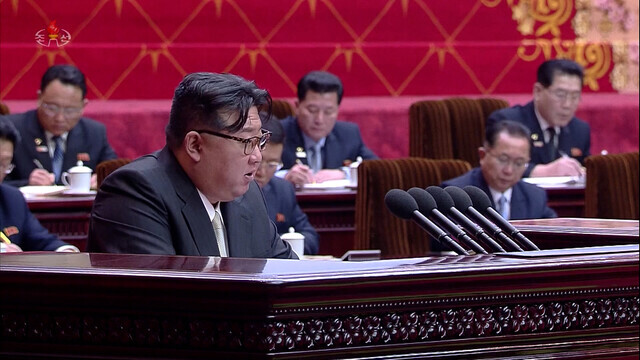hankyoreh
Links to other country sites 다른 나라 사이트 링크
[Column] How Seoul should respond to Kim Jong-un’s bellicose turn


By Park Min-hee, editorial writer
North Korea has decided to cut all ties with South Korea and is pushing for a change to the constitution to identify South Korea as its “invariable principal enemy.” As of last year, it had already enshrined the right to use preemptive nuclear strikes in its constitution.
The North is blotting out all references to “kindred ties” and “unification,” instead pursuing nuclear might with religious fervor as the country’s No. 1 national policy. These developments mark the most fundamental change on the Korean Peninsula since the Korean War.
There are many ways to read North Korea’s thought process. As of now, North Korea’s primary objective is to prevent “unification by absorption” by South Korea and solidify internal unity so as to focus on economic development.
At the same time, it appears to be setting the stage so that, when the time is right, it wields the dangerous option of pursuing reunification of the two Koreas by force, namely nuclear. These preparations come in the form of building up its nuclear weapon and missile capabilities and pursuing close relations with China and Russia.
Pyongyang has repeatedly declared in no unclear terms that it is willing to negotiate nuclear disarmament with the US in order to be recognized as a nuclear power, but that there is no possibility of negotiations or denuclearization with South Korea.
We should heed the words of Robert Carlin and Siegfried Hecker, two of the most knowledgeable US scholars of North Korea, who opine that the current situation is frighteningly similar to that of the Korean Peninsula on the brink of war in 1950, claiming, “Kim Jong-un has made a strategic decision to go to war.”
Cheong Wook-sik, the director of the Hankyoreh Peace Institute, stated in his book, “A North Korea We’ve Never Seen Before,” that the failure of the US-North Korea summit in Hanoi and the 2018 Panmunjom summit between South Korea, North Korea and the US were crucial events that made North Korea completely abandon its hopes on negotiating with the US. From that point forward, North Korea modified its policies with a focus on building up its nuclear arsenal, and has developed a hate for its “fellow countrymen” in South Korea, making it impossible to return to the situation seen during the 2018 inter-Korean summit.
Of course, even if Kim does have his heart set on war, that doesn’t necessarily mean that the situation will play out the way he’d like it to. The outcome of any such war will be drastically different depending on how accurately and sensitively South Korea and international society respond.
However, when we see how the Yoon Suk-yeol administration in the South has been dealing with the situation, we can see that its only goal is to use the North Korea problem to put the ruling party in a favorable position ahead of the upcoming general election in April.
Yoon and his ilk are relying heavily on the misapprehension that, even in the case of an inter-Korean conflict, a strong, aggressive response will be enough to bring about the collapse of the regime in Pyongyang.
Yoon and his minister of defense, Shin Won-sik, are talking such a big game about responding to North Korean threats because they believe they have the power of the US and its strategic weapons backing them up.
But let’s not forget: The US is currently fighting two arduous battles in Ukraine and in the Gaza Strip. If the Yoon administration risks conflict with North Korea at the border, only for the conflict to spread like wildfire, the US will not be able to swoop in to save the day.
While it flaunts South Korea’s trilateral cooperation with the US and Japan on every occasion, the current administration seems to be making no effort to create a long-term roadmap for resolving the issue of North Korea’s nuclear program, or to convince the US and Japan to actively respond to North Korea’s strategic shifts.
Many experts in Washington are concerned that this is leading to the neglect of the North Korean nuclear issue.
If Kim is to threaten South Korea with nuclear weapons, despite the country’s inferiority when it comes to conventional weapons and its economy, he needs the support of Russia and China, or at least their willingness to turn a blind eye.
Confident that he has secured a strategic advantage by aligning himself with Russia, Kim will likely travel to China this year to try to strengthen North Korea-China-Russia solidarity.
The goal is to create a situation similar to the one in the early 1950s, when Kim Il-sung invaded South Korea with the consent of Stalin in the Soviet Union and by involving China’s Mao Zedong.
If South Korea continues to neglect its relationship with China, this worst-case scenario could eventually become a reality.
If the Yoon administration’s response is reckless, then it’s the responsibility of South Korea’s opposition and progressives to provide a better alternative. They need to come to the cold, hard realization that the “single Korean people” narrative and the economic sponsorship card have been ineffective in denuclearizing North Korea.
It’s also erroneous to assume that dialogue with Kim Jong-un and North Korea will automatically be restored if the Democratic Party retakes power in South Korea or if Donald Trump retakes the US presidency. Even if Trump is reelected, Kim will likely engage under the pretext of retaining his nuclear weapons, while excluding South Korea from the conversation altogether. If he can’t do that, he’ll just ramp up nuclear threats and provocations against South Korea. That’s because Kim will view Trump’s resurrection as the fall of America and the weakening of its alliances. South Korean conservatives will try to make a deal with Trump to get permission for South Korea to develop its own nuclear weapons.
If Korea’s progressives fail to acknowledge the shifting tectonics in global geopolitics — if they fail to offer a viable alternative for better ensuring our national security and administering foreign policy that goes beyond the hackneyed ethno-nationalist narratives, Kim’s persistent provocations and pressure will only give credence to the policies of South Korean hard-liners, and the two Koreas will spiral downward into a relationship of symbiotic hostility. South Korean progressives need to wrench themselves out of inertia and convene a vast spectrum of expert opinions and perspectives.
The results of the recent Taiwanese presidential election gave me the impression that the Taiwanese have become stronger in the face of danger and crises. When China tried to pressure Taiwan with the ultimatum, “peace or war,” the Taiwanese refused to wilt. They voted for the Democratic Progressive Party candidate who actively seeks to distance Taiwan from China. Voters essentially said, “We will not back down.” Yet voters did not grant the same party a parliamentary majority, in what reads as a call for self-reflection and change. Younger voters opted for a third way focused on everyday issues common to Taiwanese citizens.
The Taiwanese have kept a close eye on China’s continued military threats, the threat of war, and Beijing’s suppression of Hong Kong. Threatened with annihilation, the Taiwanese are facing an existential crisis. With the worst possible scenario in mind, they carefully deliberated before choosing.
Yet South Korean politicians continue to underestimate the threat of North Korea, refusing to change. They are leading Koreans to their own existential crisis: the threat of annihilation.
Please direct questions or comments to [english@hani.co.kr]

Editorial・opinion
![[Editorial] Intensifying US-China rivalry means Seoul must address uncertainty with Beijing sooner than later [Editorial] Intensifying US-China rivalry means Seoul must address uncertainty with Beijing sooner than later](https://flexible.img.hani.co.kr/flexible/normal/500/300/imgdb/original/2024/0517/8117159322045222.jpg) [Editorial] Intensifying US-China rivalry means Seoul must address uncertainty with Beijing sooner than later
[Editorial] Intensifying US-China rivalry means Seoul must address uncertainty with Beijing sooner than later![[Column] When ‘fairness’ means hate and violence [Column] When ‘fairness’ means hate and violence](https://flexible.img.hani.co.kr/flexible/normal/500/300/imgdb/original/2024/0516/7417158465908824.jpg) [Column] When ‘fairness’ means hate and violence
[Column] When ‘fairness’ means hate and violence- [Editorial] Yoon must stop abusing authority to shield himself from investigation
- [Column] US troop withdrawal from Korea could be the Acheson Line all over
- [Column] How to win back readers who’ve turned to YouTube for news
- [Column] Welcome to the president’s pity party
- [Editorial] Korea must respond firmly to Japan’s attempt to usurp Line
- [Editorial] Transfers of prosecutors investigating Korea’s first lady send chilling message
- [Column] Will Seoul’s ties with Moscow really recover on their own?
- [Column] Samsung’s ‘lost decade’ and Lee Jae-yong’s mismatched chopsticks
Most viewed articles
- 1[Editorial] Transfers of prosecutors investigating Korea’s first lady send chilling message
- 2For new generation of Chinese artists, discontent is disobedience
- 3[Photo] 1,200 prospective teachers call death of teacher “social manslaughter”
- 4[Exclusive] Unearthed memo suggests Gwangju Uprising missing may have been cremated
- 5S. Korea “monitoring developments” after report of secret Chinese police station in Seoul
- 6[Column] US troop withdrawal from Korea could be the Acheson Line all over
- 7Xi, Putin ‘oppose acts of military intimidation’ against N. Korea by US in joint statement
- 8[Column] Samsung’s ‘lost decade’ and Lee Jae-yong’s mismatched chopsticks
- 9[Column] When ‘fairness’ means hate and violence
- 10[Editorial] Intensifying US-China rivalry means Seoul must address uncertainty with Beijing sooner t